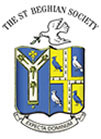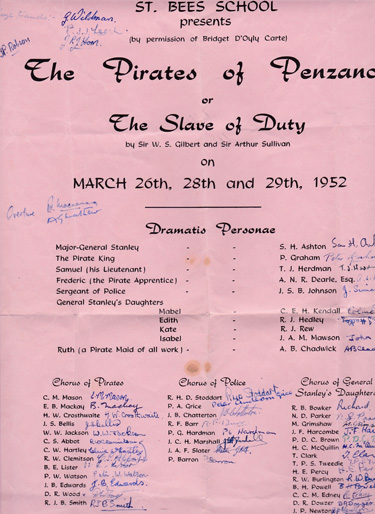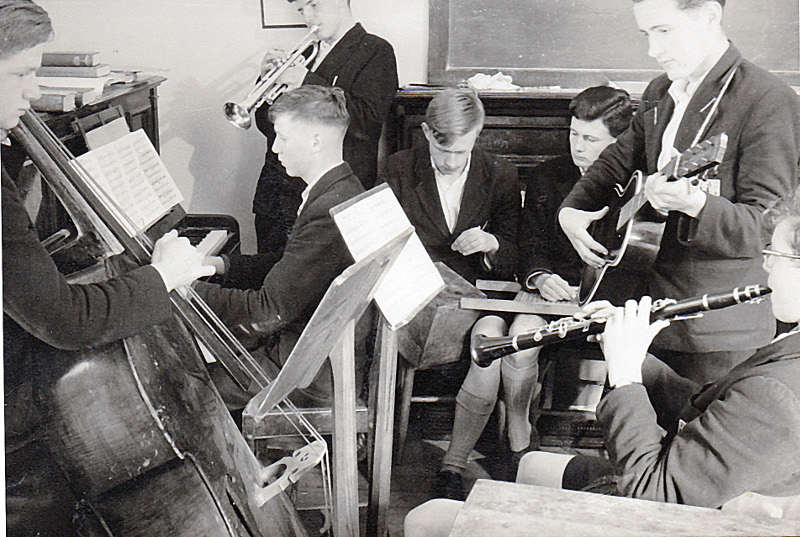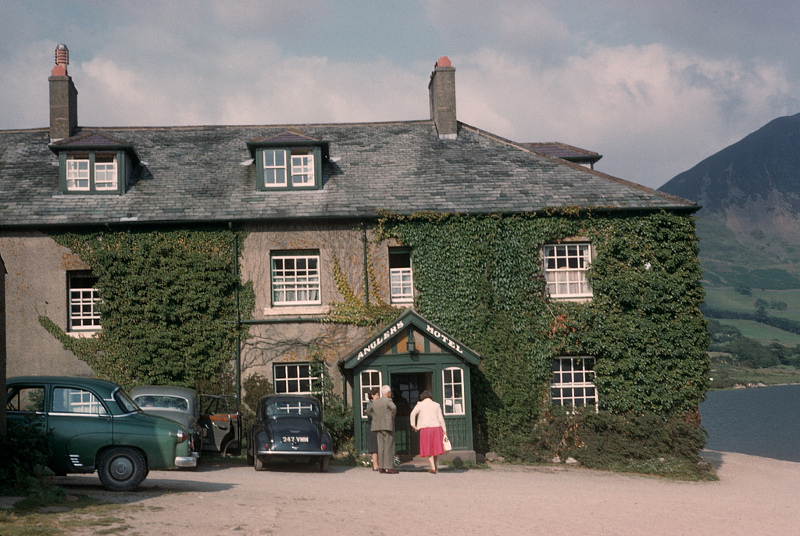|
 |
The Old St Beghian | |
| July 2020 | |||
Robert Rew (FS 50-55) has kindly contributed the following reminiscences.
“I started at St Bees in January 1950 and my family moved from Scotland to Witham in Essex in the April as I arrived home from my first term. I promptly developed haematuria and was diagnosed with Acute Nephritis (Bright's disease). I was admitted to St John's Hospital, Chelmsford, where I stayed for the next twelve weeks. I was nursed flat on my back for a month then very gradually mobilised. I therefore missed the whole of the summer term and re-started in the September.
I remained at school until July 1955. Most of the time I thoroughly enjoyed it. They say that the more you put into something then the more you get out of it, and this certainly proved to be true. I joined the choir and orchestra (I was continuing violin lessons which I started in Bournemouth aged about 6 or 7 and continued until I left school).
I joined the Science Society and became involved with theatricals, mainly as stage electrician. I learnt from my predecessor, a senior boy named Marshall, and later trained my successor, Robert Hedley and ‘phumph’ Taylor. (What a nickname!). We initially made our lights out of biscuit tins and the switchboard out of rheostats from the Physics Lab wired with 1 in 7 (or was it 9?) Signals wire ‘borrowed’ from the Armoury. No health and safety regulations back then. Many times I put Foundation House in darkness; on one occasion whilst the housemaster, ‘TA’ (Brown) was hosting a dinner party in his flat. I was told later that he passed it off with the comment that it was ‘only Rew playing with lights again!’ My only problem was that when this happened I had to get the local electrician (? Taylor) out to repair the main fuse! In due time the Memorial Hall was built and we got proper lighting and a switchboard. I did a little acting, playing Kate in The Pirates of Penzance. Robert Hedley was Edith and Colin Kendall, Mabel. Colin’s voice broke on the second night so Robert and I sang his part for him. My enduring memory of that production was Sam Ashton, as the Major-General, coming on to sing his patter song and driving his sword through the dais on which he was standing as he put his (second) hand on the top of his sword in the intro to the song. He nearly overbalanced onto the stage.
I also became a school projectionist (with others), which resulted in our being able to watch the hired films several times as they ‘needed to be checked for damage’. The films would arrive on a Friday and have to be returned the following Monday, which gave us time to see them before the official screenings. I saw Richard III seven times and Henry V about the same (the Olivier productions).As a result of being in the orchestra I was taken, during my last couple of years or so, by The Headmaster, J. C. Wykes, who played the oboe, to play with the Cumberland Symphony Orchestra, who rehearsed in Workington. I went several times and thoroughly enjoyed the experience. I joined the Second Violins, which gave me a good grounding in orchestral playing. I was also persuaded to take up the double-bass. One of my friends, Richard J. B. Smith, played the guitar and wanted to start a dance / jazz band. He eventually persuaded me to try the double-bass (he argued that it was only a big violin) and we formed quite a reasonable group. Eddie Brooks - trumpet, Ian Homersham - washboard, John Ogden - rhythm (ie biscuit tin), and self - bass. Initially we also had a pianist and clarinettist whose names escape me. The pianist was taken ill suddenly one weekend and was unable to play for a few weeks. Richard, who was by then a Day Boy and coming in to school in his own MG, said he knew someone who could play really well but as she was a girl would have to be smuggled in under the tonneau cover of the car! This duly happened as planned and Clare Robinson was smuggled into Barony and became our unofficial pianist. (See below).
As you may have realised, at a school which was renowned for sport, particularly rugby, I, being distinctly anti team sport, had to find non-sporting alternatives, which I found in fell-walking, which I loved. Three or four of us would leave school after Chapel on Sunday morning and cycle to Ennerdale, Wasdale, Loweswater or Eskdale; climb a mountain or two, have high tea at a local pub or farm (Burnthwaite Farm in Wasdale was a favourite), then cycle back to school in time for Chapel in the evening. I did this on most weekends for almost five years. The only rule the school insisted on for these trips was that there had to be a minimum of three boys in the party: one to be the body, one to stay with the body and one to go for help. (Staff were never involved at any level.) I remember this rule only being ‘used’ once and by another group who were climbing Melbreak in Loweswater, when one boy fell and broke a few bones, luckily nothing major. A day or two in hospital sorted him out. Otherwise there were no accidents during my five years. There were several small groups who went climbing/walking, of which at least one pupil, Mike Thomson, went on to climb Everest and Annapurna with Chris Bonnington.
Whilst I was at school, King George VI died and the following year Queen Elizabeth II was crowned. The school was given the day off. A group of us cycled out to Eskdale to The Bower House Inn where we had been invited to join the publican and his family to watch the coronation on their television. I’m not sure how we managed to get the invitation but I think one of our group was a family friend and had organised the visit. The TV was small, I think a nine inch screen and in black and white of course. We watched the whole ceremony, which took several hours, but did have a short break during the Anointing, when we went off for a quick walk to get some fresh air and exercise. We did not miss much though and were soon back to watch the rest of it.
Being so far from home my parents were not able to visit very much. They restricted it to a week around Speech Day in the summer. They stayed in a local pub in the village at first but later went to The Anglers Hotel, Ennerdale. This was in a delightful situation right on the lakeside. Dad was in his element as they had a generator for their electricity, which was often breaking down, and Dad offered to fix it, which he did several times. Unfortunately the pub was demolished later; I don’t know the reason unless it had to do with the fact that the lake became a reservoir for Whitehaven and Workington. It was a great shame. We used our parents as a free taxi service to take us to mountains that we couldn’t reach easily by bike. The Hedleys were another couple who were taken advantage of in this way as well. I remember my parents taking us to Honister Pass and dropping us off. We then walked to Wasdale Head via Grey Knotts, Brandreth, Green Gable, Great Gable Great End, Broad Crag and Scafell Pike. A good day!
I left school at the end of the summer term 1955 after going to my last CCF camp, which was at Catterick that year. As I was the senior cadet I was promoted to Cadet Under-Officer, which did not please Hunter, my fag, who had to take all the badges and stripes off my battle dress after he had so meticulously stitched them on only a few weeks previously! My CSM at the time was one of my close friends, Peter Brown, from Port St Mary on the Isle of Man. That corps camp was memorable as it was run by Col Carne and the ‘Glorious Glosters’. They, the Gloucestershire Regiment, had just returned from Korea where they had had a difficult time. Running the camp was supposed to give them a break! We had a good time at camp but I lost my voice after the Sunday parade trying to get my orders heard by Peter, who was bringing up the rear of the St Bees’ contingent. I went to stay with Peter shortly after this.
Follow-up: I qualified in Medicine in 1960, eventually becoming a GP, Police Surgeon (for twenty five years) and Hospice Doctor. I married Clare Robinson in August 1960. She sadly died in 1972. I married Doreen in 1974, who died in 2017. I progressed from the Cumberland Symphony Orchestra to play with The Hospitals Symphony Orchestra under Colin Davis for a while. I also played in ‘pit orchestras’ for several amateur musical shows. I retired from medicine in 1997 and we retired to Devon, where I still live.”
Home
The St Beghian Society
St Bees School,
St Bees, Cumbria, CA27 0DS.
Tel: (01946) 828093 Email: osb@stbeesschool.co.uk
Web: www.st-beghian-society.co.uk
![]()


